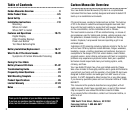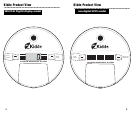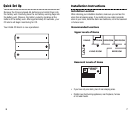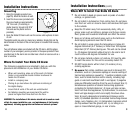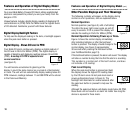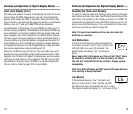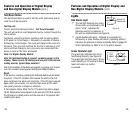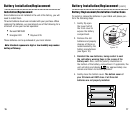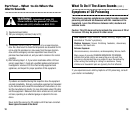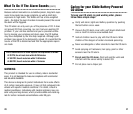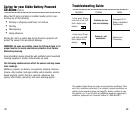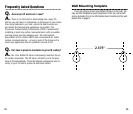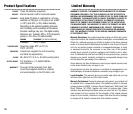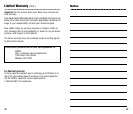
Features and Operation for Digital Display Model(cont.)
Resetting the Peak Level Reading
To reset or clear the peak level reading, press and hold the peak
level button and then press and hold the test/reset button at the
same time. The number on the display will return to 0 PPM. CO
concentrations displayed below 30 PPM in memory are for ref-
erence only and the accuracy of the concentration shown may
not be as accurate as noted on page 26.
Note: The peak level reading will also be reset when the
batteries are removed.
Unit Malfunction
In the rare event that your alarm malfunctions,
it will alert you with a short “chirp” and the red
LED will flash once every 30 seconds. The
digital model will display “Err” as shown in
Fig. 6.
Seven years after initial power up, this unit will "chirp" every
30 seconds to indicate that it is time to replace the alarm.
The unit will not detect CO in this condition. Please replace
immediately.
Note: Your Kidde CO Alarm will NOT monitor CO levels while an
error warning is being displayed.
Low Battery
If the batteries become “low”, the alarm will
alert you with a short “chirp” and the red LED
will flash once every 30 seconds for up to 7 days.
The digital models will display “Lb” as shown in Fig. 7.
Figure 6
Figure 7
Features and Operation of Digital Display Model (cont.)
Peak Level Display (Cont.)
The peak level feature is helpful in identifying low level CO occur-
rences below 30 PPM. Although the unit will not automatically
display levels below 30 PPM, it will detect and store these read-
ings in memory. By pressing the peak level button, concentration
levels as low as 11 and up to 999 PPM will be displayed.
Concentrations of CO between 0 and 30 PPM can often occur in
normal, everyday conditions. Concentrations of CO below 30 PPM may
be an indication of a transient condition that may appear today and
never reappear. Just a few examples of conditions and/or sources
that may cause low level readings are heavy automobile traffic, a
running vehicle in an attached garage, an appliance that emits CO
when starting up, a fire in a fireplace or charcoal in a nearby barbecue.
A temperature inversion can trap CO generated by traffic and other
fuel burning appliances causing readings of CO.
Some CO conditions may start out as low level leaks but could
develop into CO concentrations that could become harmful. If this
happens, the CO alarm will detect the dangerous level and alarm,
notifying you and others of the conditions. DO NOT ignore high
concentration readings above 30 PPM or a CO alarming device
that is in alarm. Refer to page 18 for more details.
12
13




